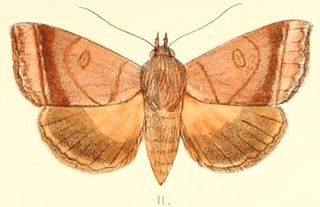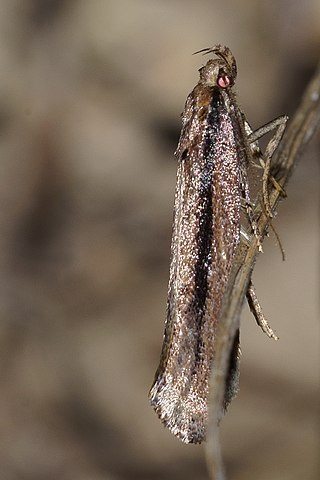Gampola is a genus of moths in the family Arctiidae. They were found from Sri Lanka, where the generic name is due to the Gampola area of Kandy, where the first species was discovered. In June 2016, another species was found from India and other few nearby countries such as China, Hong Kong, and Thailand.

Mythimna albipuncta, the white-point, is a moth of the family Noctuidae. The species was first described by Michael Denis and Ignaz Schiffermüller in 1775. It is distributed throughout Europe and one subspecies is found in Tunisia. It is also found in Asia Minor, Armenia, and Iran, and the northeastern United States.

Cataclysta lemnata, the small china-mark, is a moth species of the family Crambidae. It is found in Europe, Morocco and Iran.

Corcobara is a monotypic moth genus of the family Erebidae first described by Frederic Moore in 1882. Its only species, Corcobara angulipennis, described by the same author in the same year, is found in India, Thailand, Cambodia, Myanmar, Malaysia, Indonesia, New Guinea, Sri Lanka and the Solomons.

Mythimna decisissima is a moth of the family Noctuidae first described by Francis Walker in 1856. It is found from India across south-east Asia including Hong Kong, Japan, Taiwan and Australia in Queensland and New South Wales. It is also present in South Africa.

Ophiusa trapezium is a moth of the family Erebidae first described by Achille Guenée in 1852. It is found from the Indo-Australian tropics of India, Sri Lanka to Queensland, the Bismarck Islands and New Caledonia. Adults are fruit piercers.

Xylostola indistincta is a moth of the family Noctuidae first described by Frederic Moore in 1882. It is found from the Indo-Australian tropics of India, Sri Lanka to New Guinea.

Maliattha signifera is a species of moth of the family Noctuidae first described by Francis Walker in 1858. It is found in south-east Asia, including China, India, Japan, Taiwan, Korea and Thailand as well as in Australia (Queensland).
Scirpophaga xanthopygata is a species of moth in the family Crambidae. It is found in Russia, Ukraine, Korea, eastern China, Japan, Vietnam and Taiwan.
Ancylolomia chrysographellus, the angled grass moth, is a species of moth in the family Crambidae. It is found on Cyprus and in Kenya, Uganda, Yemen, India, Pakistan, Sri Lanka, Myanmar, China, Korea, Japan, Taiwan, the Philippines and Indonesia.

Epichorista siriana is a species of moth of the family Tortricidae. It is found in New Zealand.
Prionapteryx scitulellus is a moth in the family Crambidae described by Francis Walker in 1866. It is found in India, Sri Lanka and Kenya.
Cryptophasa balteata is a moth in the family Xyloryctidae. It was described by Francis Walker in 1866. It is found in Australia, where it has been recorded from New South Wales, Queensland and South Australia.
Echiomima fabulosa is a moth in the family Xyloryctidae. It was described by Edward Meyrick in 1915. It is found in Australia, where it has been recorded from Queensland.
Xylorycta moligera is a moth in the family Xyloryctidae. It was described by Edward Meyrick in 1914. It is found in Australia, where it has been recorded from Queensland.
Callizyga dispar is a moth in the family Depressariidae, and the only species in the genus Callizyga. It was described by Alfred Jefferis Turner in 1894 and is found in Australia, where it has been recorded from Queensland and New South Wales.
Odites eriopa is a moth in the family Depressariidae. It was described by Edward Meyrick in 1908. It is found in Assam, India.
Odites furfurosa is a moth in the family Depressariidae. It was described by Edward Meyrick in 1906. It is found in Sri Lanka.
Eretmocera fasciata is a moth of the family Scythrididae. It was described by Baron Walsingham in 1896. It is found in Saudi Arabia, Yemen and Somalia.

Atomotricha versuta is a moth in the family Oecophoridae first described by Edward Meyrick in 1914. It is endemic to New Zealand and has been observed in both the North and South Islands. The adults of the species are variable in appearance but the three principal variteis are connected b intermediate forms. The female of the species is brachypterous and is incapable of flight. Both the adult male and female have been observed resting on fences during cold winter nights.









